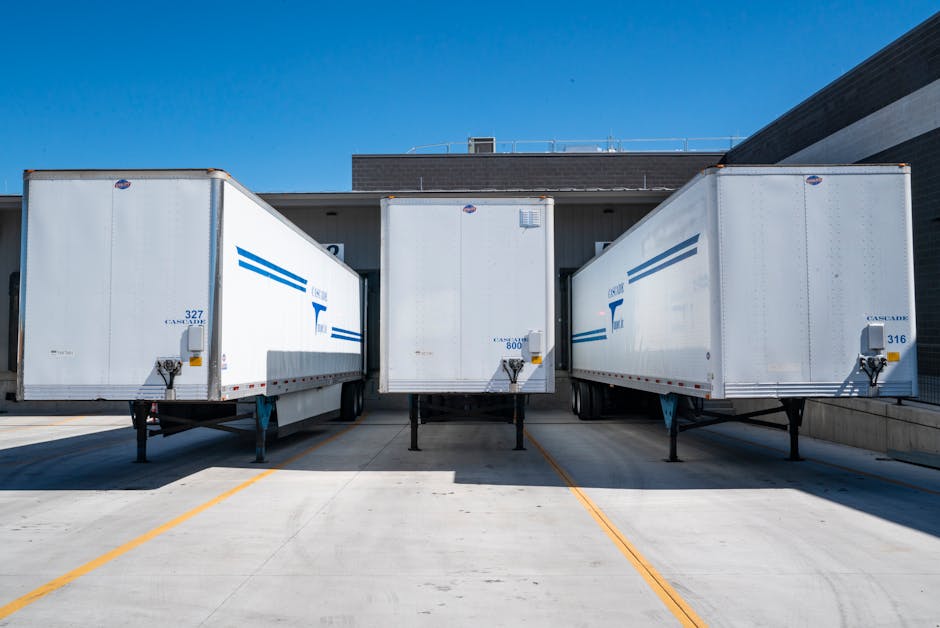

In the realm of transportation and logistics, ensuring the safety and efficiency of trailers is of paramount importance. **Advanced trailer tire monitoring** systems have emerged as a revolutionary solution to address these concerns. These systems are designed to provide real-time data on tire pressure, temperature, and other crucial parameters, ensuring that trailers operate optimally and safely.
With the increasing demand for freight transportation, the need for smart and efficient logistics solutions is more pressing than ever. Advanced trailer tire monitoring systems not only enhance safety but also contribute to the longevity and performance of the trailer. By continuously monitoring tire conditions, these systems help in the early detection of potential issues, such as under-inflation or overheating, which can lead to catastrophic failures if left unchecked. This proactive approach not only prevents costly breakdowns but also significantly reduces the risk of accidents on the road.
Furthermore, integrating such systems into trailers helps fleet managers optimize maintenance schedules, thus reducing downtime and improving overall operational efficiency. By maintaining optimal tire conditions, fuel efficiency is also enhanced, leading to cost savings and a reduced environmental footprint.
Incorporating advanced trailer tire monitoring is not merely a trend but a necessity for those seeking to stay ahead in the competitive logistics industry. **Tow with peace of mind**, knowing that TrailerWatchdog is standing guard, ensuring your trailers are in top condition for every journey.
Importance of Tire Monitoring Systems

In the world of transportation, the **importance of tire monitoring systems** cannot be overstated. Tires are a fundamental component of any trailer, directly impacting safety, performance, and efficiency on the road. By implementing advanced tire monitoring systems, operators can significantly mitigate risks associated with tire failures.
Tire blowouts and failures are not only costly but also dangerous, potentially leading to severe accidents and cargo damage. These incidents can be largely prevented with timely data on tire health. Monitoring systems provide real-time insights into tire pressure and temperature, allowing for immediate corrective actions if necessary. This proactive monitoring helps avoid unexpected downtimes and improves safety for both drivers and other road users.
Moreover, maintaining optimal tire pressure is crucial for fuel efficiency. Under-inflated tires create more rolling resistance, leading to increased fuel consumption and higher operational costs. By continuously monitoring tire conditions, fleet operators can ensure that tires are always at their optimal pressure, thus optimizing fuel efficiency and reducing operational expenses.
Additionally, proper tire maintenance extends the lifespan of the tires, reducing the frequency of replacements and contributing to overall cost savings. The data collected from these systems can also aid in strategic planning for maintenance schedules, ensuring that repairs and replacements are done at the most opportune times, thereby minimizing disruptions to operations.
In essence, the adoption of tire monitoring systems is a strategic investment that yields significant returns in terms of safety, efficiency, and cost savings, making it an indispensable tool for modern fleet management.
Key Features of Advanced Systems

When considering **advanced trailer tire monitoring systems**, it's essential to understand the key features that set them apart from traditional methods. These systems are designed to provide comprehensive insights into tire health, enhancing both safety and operational efficiency.
One of the standout features is real-time data transmission. Advanced systems continuously collect and transmit data on tire pressure and temperature, enabling immediate detection of abnormalities. This feature is crucial for preventing tire blowouts, as it allows for quick corrective actions.
Another significant feature is the **integration with telematics systems**. This allows fleet operators to monitor tire conditions remotely, offering a holistic view of the entire fleet's status. Such integration supports data-driven decisions, helping to optimize routes and maintenance schedules based on real-time tire data.
Moreover, **predictive analytics capabilities** are increasingly becoming a part of these systems. By analyzing historical data, these systems can predict when a tire is likely to fail, allowing for preemptive maintenance and reducing the risk of unexpected failures.
- Automatic alerts and notifications are also a critical component, ensuring that operators are promptly informed of any critical changes in tire conditions.
- Many advanced systems boast user-friendly interfaces, providing easy access to data and reports, making it simpler for operators to interpret and act on the information.
Lastly, the **durability and adaptability** of these systems make them suitable for various types of trailers and operating conditions. They are designed to withstand harsh environments, ensuring reliable performance across diverse scenarios.
Incorporating these advanced features into tire monitoring systems not only enhances safety and efficiency but also represents a forward-thinking approach to fleet management, aligning with the increasing demands of modern logistics.
Benefits of Real-Time Tire Data

Incorporating **real-time tire data** into trailer operations offers numerous advantages, significantly transforming the way fleet management is approached. One of the primary benefits is the enhancement of **safety**. By providing up-to-the-minute information on tire pressure and temperature, these systems offer a proactive approach to identifying potential hazards before they lead to catastrophic failure.
Protect your trailer
Another significant advantage is the **reduction in maintenance costs**. Real-time data allows for timely interventions, targeting issues before they escalate into costly repairs. Instead of relying on scheduled maintenance, operators can adopt a condition-based approach, effectively extending the life of tires and other components.
**Operational efficiency** is also greatly improved by real-time monitoring. With constant access to tire data, fleet managers can make informed decisions swiftly, optimizing routes and reducing downtime. This data-driven approach ensures that vehicles spend more time on the road and less time in the repair shop, ultimately boosting productivity.
Additionally, **fuel efficiency** sees notable improvements. Properly inflated tires decrease rolling resistance, leading to better fuel consumption. Real-time monitoring ensures that tire pressure is always at optimal levels, contributing to overall fuel savings.
- Environmental impact is another area where real-time data contributes positively. By optimizing fuel use and extending tire life, these systems help reduce the carbon footprint of the fleet, aligning operations with sustainability goals.
- Furthermore, **driver satisfaction** is enhanced as real-time insights reduce the likelihood of breakdowns and ensure smoother, safer journeys.
The integration of real-time tire data into fleet operations is not merely a trend but a strategic move towards more **intelligent and sustainable transportation**. It empowers businesses to operate more effectively while safeguarding their assets and the environment.
Integrating Monitoring With Smart Trailers
The evolution of **smart trailers** is significantly enhanced by integrating advanced monitoring systems. This fusion transforms traditional trailers into **intelligent assets** that provide real-time insights and analytics, ensuring both efficiency and safety on the road. At the heart of this integration is the ability to collect and analyze data from various trailer components, particularly tires.
By combining **advanced trailer tire monitoring** with smart technologies, operators can leverage a wealth of information. This includes tire pressure, temperature, and axle load data, all crucial for maintaining optimal performance. These systems work seamlessly with GPS and telematics, offering a comprehensive overview of the trailer's condition and location.
**Data integration** is key to utilizing these systems effectively. It involves harnessing the power of IoT (Internet of Things) to connect sensors and devices, creating a network that communicates in real-time. This connectivity allows fleet managers to receive alerts and reports directly to their devices, facilitating prompt decision-making.
The benefits of such integration extend beyond just maintenance and safety. It plays a pivotal role in **fleet management**, providing insights that can lead to cost savings and efficiency improvements. For instance, understanding tire wear patterns can inform purchasing decisions, while real-time alerts can prevent unscheduled downtime.
- Furthermore, the integration supports **regulatory compliance** by ensuring that trailers meet safety standards and documentation requirements effortlessly.
- With the ability to anticipate issues before they arise, this technology minimizes risk and maximizes operational uptime.
The integration of monitoring systems with smart trailers is not just an upgrade; it's a significant shift towards a more proactive and responsive mode of operation. This transformation is essential for businesses looking to remain competitive in an increasingly digital and data-driven world.
Future Trends in Trailer Tire Technology

As technology continues to advance, the trailer industry is poised for a revolution driven by **innovative tire technologies**. One of the most promising developments is the rise of **smart tires**, equipped with embedded sensors capable of transmitting real-time data on pressure, temperature, and tread wear. This data, when integrated with advanced monitoring systems, enables predictive maintenance and enhances safety.
Another exciting trend is the development of **self-inflating tires**. These tires adjust their pressure automatically to maintain optimal levels, reducing the risk of blowouts and improving fuel efficiency. This feature is particularly beneficial for long-haul transportation, where consistent tire pressure can significantly impact performance.
The use of **eco-friendly materials** in tire manufacturing is also gaining traction. Manufacturers are focusing on sustainable materials that not only reduce environmental impact but also enhance the durability and performance of tires.
Moreover, the incorporation of **AI and machine learning** into tire technology is on the horizon. These technologies can analyze data patterns to predict potential failures and optimize tire performance dynamically. This integration will further bridge the gap between traditional trailers and fully autonomous systems.
In addition to these innovations, there is a growing emphasis on **connected vehicles**. Trailers will increasingly communicate with towing vehicles and fleet management systems to provide a holistic view of the transport ecosystem. This connectivity will facilitate smarter logistics and improved operational efficiency.
As these trends unfold, staying ahead in the industry requires adopting these **cutting-edge technologies**. Tow with peace of mind, knowing that TrailerWatchdog is standing guard. Embrace the future of trailer safety and efficiency with confidence and foresight.




